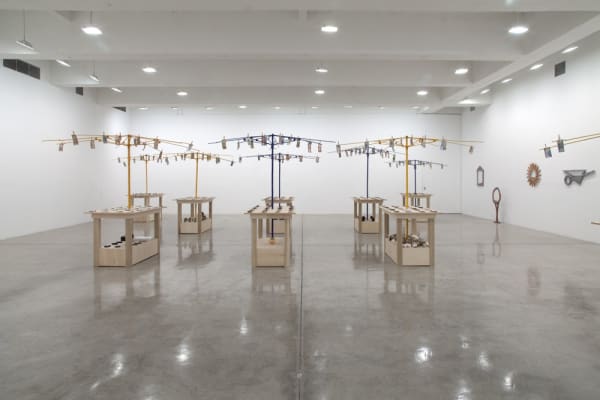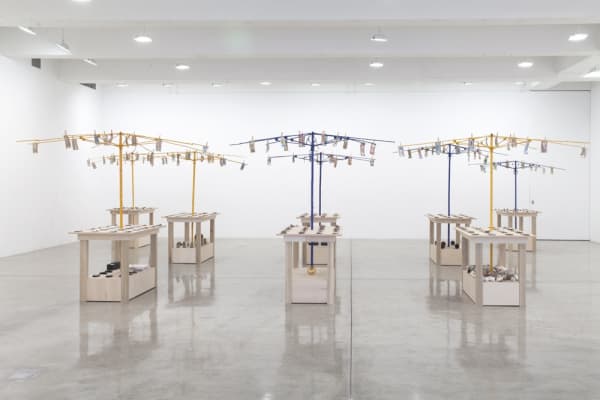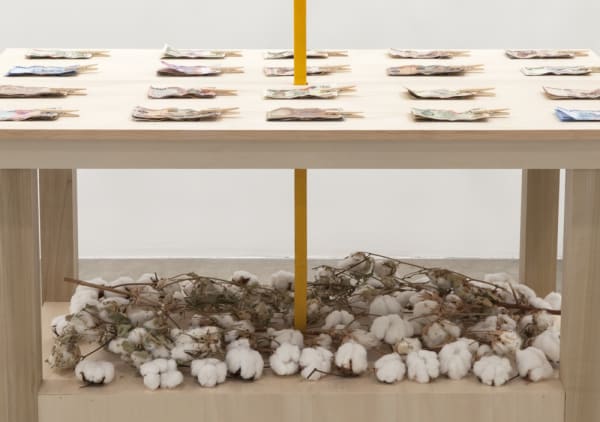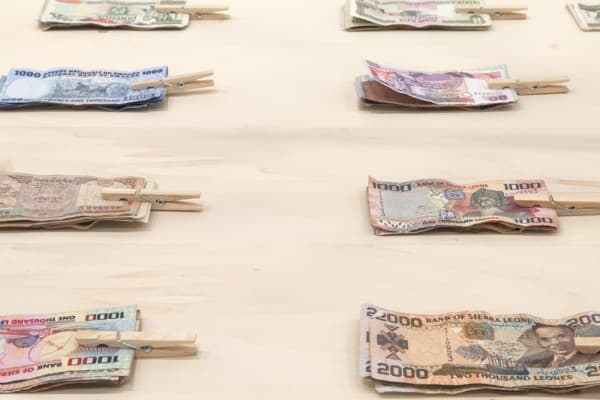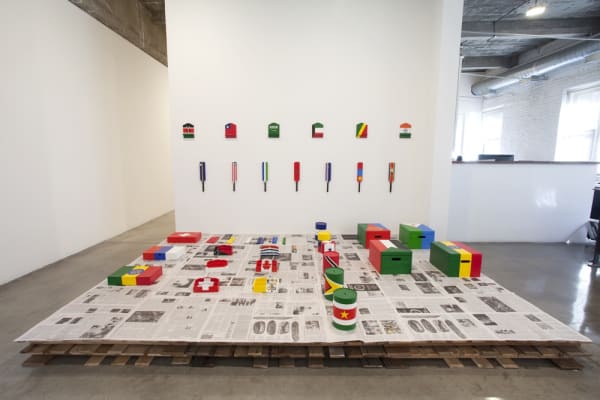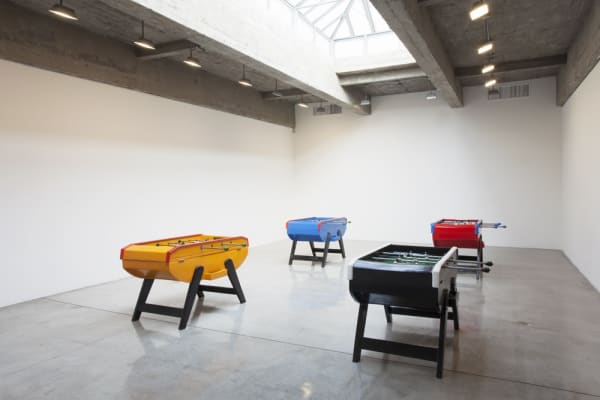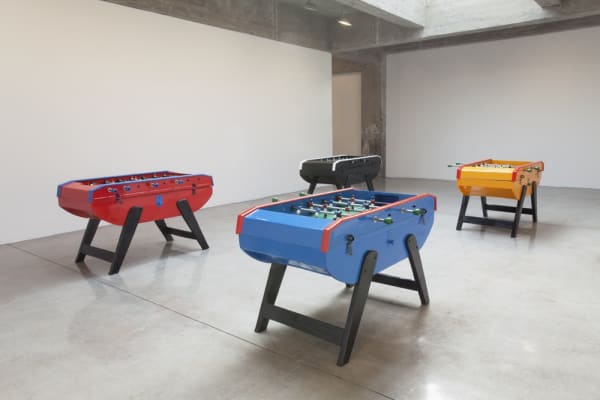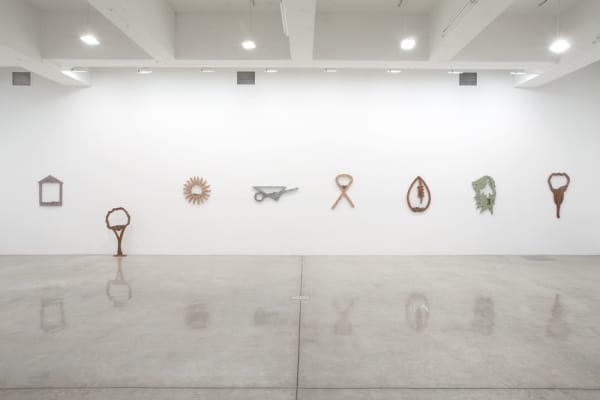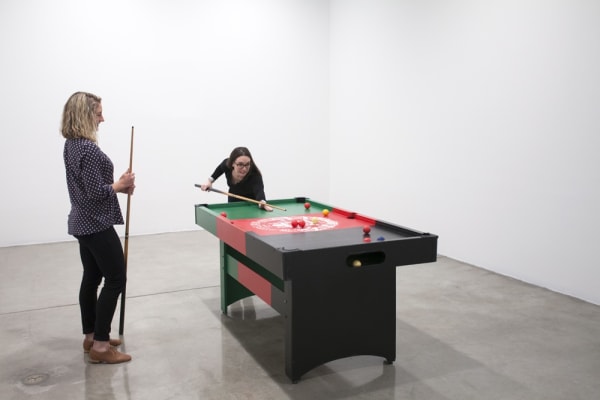MESCHAC GABA: EXCHANGE MARKET: Tanya Bonakdar Gallery, New York
Tanya Bonakdar Gallery is very pleased to present its first solo exhibition with Meschac Gaba. Titled Exchange Market, this show is the artist’s first one-person gallery presentation in the United States.
Since the late-1990’s, Gaba has closely examined constructions of cultural identity as they relate to exchanges between Africa and the Western world. Inspired by his own experiences living between the Netherlands and Benin, his birthplace in West Africa, the artist’s work questions codes of identity and value by playfully restructuring relationships between "first" and "third" worlds, the local and the global, art and the everyday. At once critical and lighthearted, his approach invites viewers to look beyond established systems and hierarchies and consider a new way of thinking and acting globally, one hinging on practices of adaptation and collaboration rather than on conformity.
Within the ground floor gallery, Gaba’s new ten-table installation titled Bureau d'échange [Exchange Office] applies these practices of adaptation to systems of cultural and economic value. Reminiscent of marketplace stands, each table presents a different collection of symbolic objects and raw materials – gold-covered stones and hand tools, cotton bolls, devalued African banknotes and smart phones, among other items connected to money – all carefully arranged under salvaged umbrella frames. Incorporating devalued currency as both a medium and symbol, these works reflect Africa’s struggling economies within the broader exchanges and dependencies between today’s developed and underdeveloped worlds, a fractured reality symbolized here by the shadeless parasols. More fundamentally, each display critiques underlying principals of value at play in global relationships, hinting at the ways in which value is ascribed and, as evidenced by Gaba’s evocative collections, has the potential to be renegotiated.
Also presented in the downstairs exhibition space is a new series of wall-mounted and freestanding coin banks. Known as bankivi in a mixed French-Mina dialect, these works take the shapes of culturally significant figures and animals, some referencing logos of African and Western banks, others emblems of causes and resources. While reminiscent of fundraising displays like UNICEF or UNESCO donation boxes found in airports, Gaba’s banks are not meant for aid or charity, but rather for savings. Through individual contribution and collective investment, these works reveal an equality and unity that comes with a shared aspiration for a better world.
Themes of collaboration and belonging also play out in the artist’s latest series of table games installed in the upstairs gallery space. Building on his longtime work with recreational activities and interactive games, Gaba’s new project brings together four coin-operated soccer tables, each handmade in Benin. While mimicking the design of European models, these versions deviate from the traditional setup and sleek, manufactured aesthetic of Western tables. Here, painted fields and figures reveal teams of mixed races, nationalities and religions, many symbolically reconfigured as single-team, single-goal tables. Through teamwork and collective strategy, Gaba's games of globalization offer viewers the opportunity to become part of the collaborative exchanges and unified systems they represent, all driven by mutual interests, goals and values.
In the adjacent gallery, a playfully patriotic billiard game similarly reorients codes of nationality. Titled Iran, this work takes the form of a miniature pool table painted in the colors of the nation’s flag and includes a rack of snooker balls and cues. Nearby, other flag-covered objects appear along the walls and floor, arranged on top of wooden pallets resembling those found in West African markets. Referencing the commodification of nationalist symbols alongside systems of trade, this display questions the inherent value of these symbols as contexts shift from the political to the artistic to the everyday. Here, powerful indicators of identity and global politics become indistinguishable from painting, game and souvenir.
Born in Cotonou, Benin in 1961, Gaba has presented major works at the 50th Venice Biennial (2003) and at Documenta 11 (2002), among other key exhibitions worldwide. In 2013, Tate Modern acquired and exhibited his major installation, Museum of Contemporary African Art (1997-2002), a project consisting of twelve interactive “rooms” of a nomadic museum. Recent group presentations include The Invisible Hand: Curating as Gesture, 2nd CAFAM Biennale, CAFA Art Museum, Beijing (2014); Geestverwanten (Kindred Spirits), Rabo Art Collection, Utrecht, The Netherlands (2013-2014); Station to Station organized by Doug Aitken (2013), When Attitudes Became Form Become Attitudes: A Restoration / A Remake / A Rejuvenation / A Rebellion, CCA Wattis Institute for Contemporary Arts, San Francisco (2012), and Intense Proximity: La Triennale 2012, Palais de Tokyo, Paris, 2012 (group).
Meschac Gaba's exhibition is supported as part of the Dutch Culture USA program by the Consulate General of the Netherlands in New York.
All installation images above: Photo by Jean Vong
